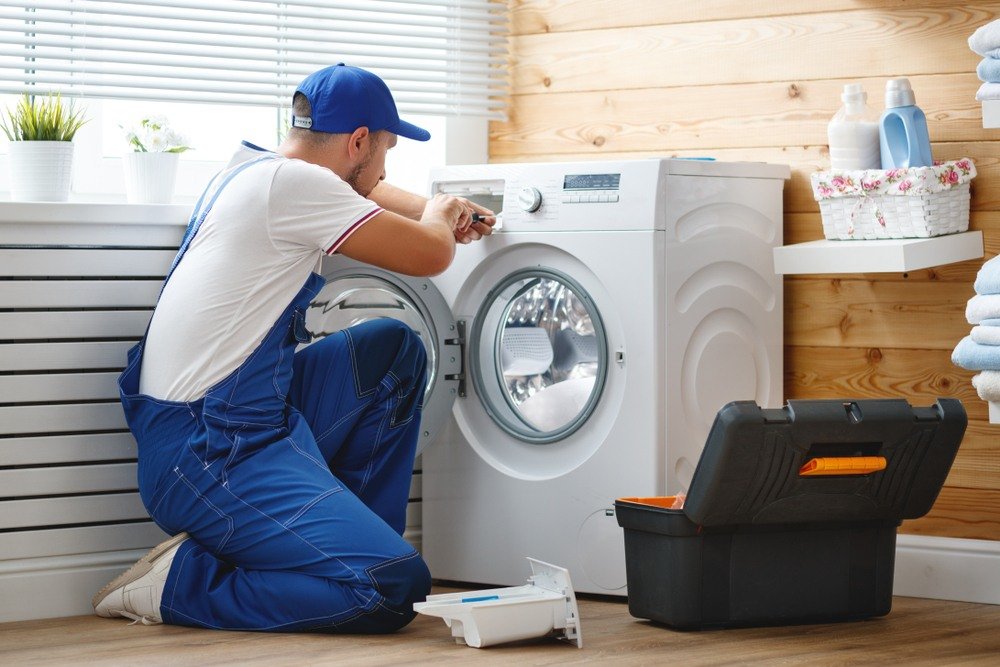How to Make Your Appliances Last Longer
Large appliances such as refrigerators, dishwashers, and air conditioners make life convenient and our homes more comfortable. For many, they’re essential parts of day-to-day life. But, what happens when they stop working? Replacing broken devices is not cheap—in fact, it can cost between $350 to $8000. Fortunately, there are ways to make your appliances last longer so you can avoid paying these replacement costs for as long as possible.
Air Conditioner
Most air conditioners will need to be replaced after 12 to 15 years. The key to extending the lifespan of your air conditioner is preventative maintenance. It’s best to schedule regular appointments with a professional air conditioner technician. The technician can inspect the unit to identify issues that need to be addressed before they grow into bigger problems. During this appointment, the technician can also look for airflow blockages and clean the unit to ensure it can work properly for as long as possible.
There are things you can do to make your air conditioner last longer without the help of a professional, too. Get in the habit of changing the air filters every two to three months. Air conditioners must work harder to cool your home if your air filters are dirty, so replacing these filters regularly makes it easier for this appliance to do its job. It’s also smart to turn the air conditioner off when it’s not needed. If you’re not going to be home for a long period of time, turn off your air conditioner to give it a much-needed break. Running the air conditioner all the time can shorten its lifespan, so turn it off when you don’t need it to extend its lifespan.
Furnace
A furnace should last between 15 to 25 years, depending on how well it is maintained. People who take good care of their furnaces could use the same one for well over 30 years. Maximize your furnace’s lifespan by keeping it at the same temperature for at least 8 hours before adjusting it. Changing the temperature multiple times throughout the day can put a strain on the furnace and affect its performance.
Dirty air filters can also force the furnace to work harder than it needs to, shortening its life span. To avoid this problem, check the air filters frequently to see if they need to be replaced.
Make sure the area around the furnace is clear, too. Other items could block the furnace’s airflow and reduce its efficiency. Plus, there is burning gas inside the furnace, so it’s not wise to keep items too close.
It’s also recommended that you schedule an annual inspection to keep your furnace in good shape. A technician can perform an inspection and repair issues that could cause major problems in the future. Preventative maintenance is the most effective way to keep your furnace running smoothly for years to come.

Dishwasher
The average dishwasher will last for about 9 years before it needs to be replaced. If you want to see your dishwasher reach double digits, it’s important to only wash dishwasher-safe items. Items that are not dishwasher-safe could melt. If small pieces break off of the item, they could end up clogging the filter and putting unnecessary wear and tear on your dishwasher. Other items such as toothpicks, chicken bones, and large pieces of leftover food can also clog the filter, so make sure these items do not go in the dishwasher with your dirty dishes.
Manufacturers also recommend waiting until the dishwasher is completely full before pushing “start.” Implementing this strategy will reduce the number of times your dishwasher runs, which is an effective way to make the appliance last longer.
Run the “clean dishwasher” cycle about once per month. This cycle is designed to thoroughly clean the parts of the dishwasher to ensure the appliance can continue to run smoothly for as long as possible. It also removes mineral buildup, which can put a strain on your dishwasher and shorten its lifespan.
Choose the same day of the month to run this cycle and program a reminder into your smartphone’s calendar.
Refrigerator
The refrigerator is one of the most expensive appliances in your home, but fortunately, you should not have to replace it for about 11 years. Extend its life even further by cleaning the inside and outside of the refrigerator on a regular basis. Pay close attention to the coils behind the refrigerator. The coils play an important role in cooling, and dirty coils can strain the compressor and shorten the refrigerator’s lifespan.
Overfilling the refrigerator can also strain the compressor. Why? Filling the refrigerator with too much food can block the airflow, so the compressor will have to work twice as hard to keep the refrigerator running properly. If your fridge is too full, make sure you throw items away that you no longer need so you can avoid this problem.
Don’t use the top of your refrigerator as a storage space, either. Most refrigerators are designed to release hot air through the top as it cools the food inside. If the top of the refrigerator is blocked, this can affect its performance and drastically reduce its lifespan.
Range
The range in your kitchen can last between 14 to 16 years, but you could extend its life even further by following a few simple tips. If you have a gas range, check the color of the flame on a regular basis. A steady blue flame indicates the range is working perfectly, whereas a yellow or orange flame indicates that the burner needs a cleaning. If you see a yellow or orange flame, take the time to remove food particles and other debris from your burner to keep it working properly.
If you have a smooth-top stove, make sure you place pots and pans down gently onto the burners. If you need to move a pot or pan to a different burner, pick it up and place it down instead of dragging it across the range. Hitting the range too hard or dragging a heavy item across it can damage the burners and shorten the appliance’s lifespan.
Dryer
The average dryer lasts for approximately 13 years, but there are simple things you can do to make it last even longer. The easiest way to extend your dryer’s lifespan is removing the lint on the filter after each use. Keeping this filter clean will improve the airflow and ensure your dryer continues to run smoothly.
You should also check what type of dryer duct is installed in your dryer. If it’s plastic or foil, replace it with an inexpensive metal dryer duct. Plastic and foil ducts start to sag over time, so lint can build up and reduce the efficiency of your dryer. Metal ducts will not have this problem, so they can help your dryer last much longer.
Turning on the moisture sensor can also make your dryer live a longer life. The moisture sensor will automatically turn the dryer off when it detects that a load of laundry is completely dry. This feature reduces the amount of energy the dryer uses and the amount of time that it runs, thus increasing its lifespan.

Washing Machine
You probably won’t need to part ways with your washer for about 10 years. But, if you’re not ready to say goodbye, there are ways to extend this appliance’s life by a few more years. After every few washes, clean the inside of the washer and the detergent drawer. This will remove residue, dirt, and other debris that could affect your washer’s performance.
You should also avoid putting oversized loads of laundry in the washer. An oversized load strains the various components of the washer and shortens its lifespan.
The minerals in your water can build up in the washer’s hoses and valves, which will restrict water and airflow and shorten its lifespan. To remove this mineral buildup, turn on the washer’s self-cleaning cycle on a regular basis. If your machine doesn’t have this option, fill the washer with cold water and add one cup of vinegar. Then, let the washer run without any clothes inside to give it the self-cleaning it needs to run smoothly for years to come.
Water Heater
The lifespan of a water heater will vary depending on whether it is tankless or not. A water heater with a tank lasts for approximately 12 years, whereas a tankless water heater can last for around 20 years. If you want to make it last even longer, remember to flush the appliance every one to three years to remove mineral buildup. Many people perform this task on their own, but if you don’t feel comfortable, contact a professional for help instead.
You should also talk to a professional about replacing the anode in your water heater. The anode rod attracts corrosive elements inside your hot water heater so they do not cause your hot water heater to rust. Over time, the anode rod will start to rust as a result of attracting so many corrosive elements. If it has a significant amount of rust on it, it won’t be able to protect your hot water heater from these corrosive elements any longer. Ask a professional to replace this part to make your water heater last as long as possible.
Don’t forget to give your water heater a break. If you’re going on vacation, turn the hot water heater off so it can enjoy a short vacation as well. Giving your water heater short breaks when hot water is not needed will keep it running smoothly for a long time.
Maintaining appliances and using them in a way that does not strain them can drastically increase their lifespans. Take the time to implement these strategies in your home so you can avoid spending thousands of dollars on replacement appliances!



